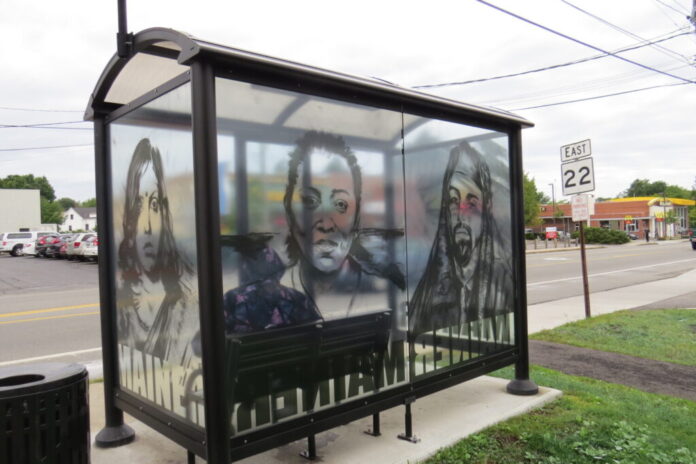By Michael Kelley
PORTLAND — Bus shelters in Portland have become a new canvas for public art.
The third and final piece of art was installed last week as part of Creative Portland’s Creative Bus Shelter program, an initiative funded in part through a $25,000 matching grant from the National Endowment for the Arts.
Each of the three pieces, installed at the bus stops at 519 Congress St., 325 St. John St. and 88 Bedford St., “celebrate the diversity of the community” and also serve a greater purpose, said Creative Portland Executive Director Dinah Minot.
“Public art strengthens communities not only because of the inviting aesthetic, but because it can be impactful, anchoring one’s experience,” Minot said. “Public art attracts community conversations and curiosity about the artist, the message, the design and the feeling it evokes.”
University of Southern Maine President Glenn Cummings hopes Portland native and USM graduate Justin Levesque’s piece will evoke those community conversations. “Glacial Retreat” is installed at the Bedford Street bus stop at the campus.
“We value the impact of art in encouraging discourse on climate change among students, faculty, staff and visitors on the Portland campus,” said USM President Glenn Cummings.
“Hope and Friendship” by Portland artist and Maine College of Art graduate Ebenezer Akakpo is displayed at the bus shelter at 519 Congress St. It features the Adinkra symbols of hope and friendship in Ghana, Akakpo’s home country.
“His captivating designs reflect a deep cultural history and a passion for promoting social justice. They remind us to be open to new experiences and to ask what we have in common rather than what separates us,” said Maine College of Art President Laura Freid.
At the St. John Street shelter, “The Mainer Project” by Orson Horschler, who goes by the name “Pigeon,” celebrates the city’s diversity.
The hope, he said, is to build community “by inspiring discourse on identity and by confronting the attitudes that prevent us from feeling at home in the place we live.”
The artists each received $4,500 for their work.
All three pieces will get a lot of attention, said Denise Beck, marketing manager for Greater Portland Metro, which, along with Greater Portland Council of Governments, teamed with Creative Portland on the project.
“They are really going to stand out for people driving by, waiting for the bus or walking passed the shelter. It’s fun. It’s different,” she said.
Minot hopes this is only the beginning of art on bus shelters. She has applied for another NEA grant to add art to another 10 to 12 bus shelters.
“Having art on public bus shelters shines a spotlight on public transportation, but at the same time, I think it is a real win for the artists involved,” she said.
Kelley, M. (2020, September 08). Art starts at bus stops. Retrieved September 09, 2020.
https://www.pressherald.com/2020/09/08/art-starts-at-bus-stops/
Analysis–
This article is about art on bus stops. Three art pieces were installed on bus stops in Portland, Oregon. These works of art aim to bring the community together as public art tends to attract people and encourage discussion. Since they are placed at bus stops, anyone can see it. Whether you are waiting for the bus, using it as temporary shelter, or just driving or walking by, you can see it and wonder to yourself. Many of the topics of these artworks revolve around promoting social justice.
I found this article to be relevant because the bus stop is a place that bus drivers do frequent. Having art placed there changes up the scenery and could help improve the bus driver’s day. I think this is a good idea and presents an opportunity for designing for bus drivers. How could we design something that can be used by both the bus driver and passengers to learn from and create conversation from?




